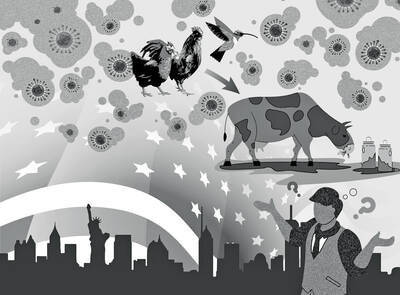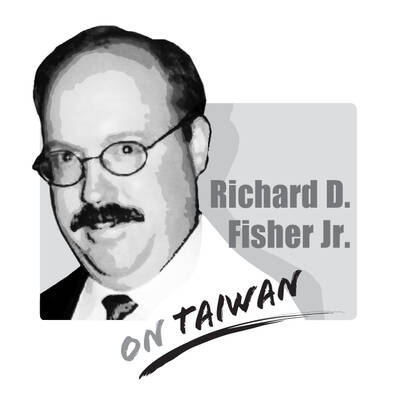After success in the local elections in November last year, several newly elected Chinese Nationalist Party (KMT) Taipei city councilors appear to be eyeing legislative seats up for grabs in next year’s elections.
The KMT has won control of 14 of 22 cities and counties, and 367 — or 40.3 percent — of the local councilor seats, the most among all political parties.
The KMT’s success in the local elections has boosted the party’s confidence that it could win the presidential election and dominate the legislature next year. When then-KMT Taipei city councilor Wang Hung-wei (王鴻薇) won the legislative seat vacated by Taipei Mayor Chiang Wan-an (蔣萬安) in a by-election last month, several city councilors seemed eager to follow in her footsteps and become legislators.
Wang was re-elected as city councilor — a position she held for just five days before announcing her bid to run in the legislative by-election. She won the by-election on Jan. 8, and became a legislator on Jan. 16, only 51 days after being elected as a city councilor.
KMT Taipei City Councilor Hsu Chiao-hsin (徐巧芯), who is in her 30s and won the most votes in her constituency, on Wednesday last week said she would run in the KMT’s legislative primaries, challenging KMT Legislator Alex Fai (費鴻泰), who is in his 60s and has been a legislator since 2005, as she called for the older generation to step aside for younger politicians.
KMT Taipei city councilors Lo Chih-chiang (羅智強), Yu Shu-hui (游淑慧), Chang Szu-kang (張斯綱), William Hsu (徐弘庭), Chung Pei-chun (鍾沛君) and Chung Hsiao-ping (鍾小平) have also expressed their intent to run in the legislative primaries.
Chung Hsiao-ping this month said that he wanted to gather 15 to 20 younger KMT city councilors from the six special municipalities to form a “league” that would “save the party and the nation” by winning the majority of legislative seats. Others have also said that they have better “combat abilities” in the fight against the Democratic Progressive Party (DPP) than sitting legislators.
Although running in another election while holding a seat is not against the law, these candidates have been called “runaway” mayors or councilors, as was former Kaohsiung mayor Han Kuo-yu (韓國瑜) of the KMT, who ran in the 2020 presidential election only a year after he became mayor in 2018. He was removed as mayor in a recall vote in 2020, a reflection of residents’ dissatisfaction.
As the new city councilors have only been in office for less than two months, but already have their eyes on a new position, their devotion to their constituents is questionable.
The Local Government Act (地方制度法) states that a by-election cannot be held unless more than one-third of all council seats or more than half of the council seats in a constituency are vacant, so if these city councilors are elected as legislators, their constituencies would lose a representative.
If the KMT city councilors truly want to better serve the people and believe in nourishing young talent for the party, they should have offered their councilor nominations to newcomers, while focusing their efforts on preparing for the legislative elections, as former DPP city councilors Juan Chao-hsiung (阮昭雄), Ho Po-wen (何博文) and Lee Yen-hui (李妍慧) did last year.
Securing a seat in a city council and using it as a stepping stone to pursue a higher position serves their own interests more than those of the public. It is ultimately up to voters as to whether these councilors follow the fate of Wang or Han.
A series of strong earthquakes in Hualien County not only caused severe damage in Taiwan, but also revealed that China’s power has permeated everywhere. A Taiwanese woman posted on the Internet that she found clips of the earthquake — which were recorded by the security camera in her home — on the Chinese social media platform Xiaohongshu. It is spine-chilling that the problem might be because the security camera was manufactured in China. China has widely collected information, infringed upon public privacy and raised information security threats through various social media platforms, as well as telecommunication and security equipment. Several former TikTok employees revealed

The bird flu outbreak at US dairy farms keeps finding alarming new ways to surprise scientists. Last week, the US Department of Agriculture (USDA) confirmed that H5N1 is spreading not just from birds to herds, but among cows. Meanwhile, media reports say that an unknown number of cows are asymptomatic. Although the risk to humans is still low, it is clear that far more work needs to be done to get a handle on the reach of the virus and how it is being transmitted. That would require the USDA and the Centers for Disease Control and Prevention (CDC) to get

For the incoming Administration of President-elect William Lai (賴清德), successfully deterring a Chinese Communist Party (CCP) attack or invasion of democratic Taiwan over his four-year term would be a clear victory. But it could also be a curse, because during those four years the CCP’s People’s Liberation Army (PLA) will grow far stronger. As such, increased vigilance in Washington and Taipei will be needed to ensure that already multiplying CCP threat trends don’t overwhelm Taiwan, the United States, and their democratic allies. One CCP attempt to overwhelm was announced on April 19, 2024, namely that the PLA had erred in combining major missions
On April 11, Japanese Prime Minister Fumio Kishida delivered a speech at a joint meeting of the US Congress in Washington, in which he said that “China’s current external stance and military actions present an unprecedented and the greatest strategic challenge … to the peace and stability of the international community.” Kishida emphasized Japan’s role as “the US’ closest ally.” “The international order that the US worked for generations to build is facing new challenges,” Kishida said. “I understand it is a heavy burden to carry such hopes on your shoulders,” he said. “Japan is already standing shoulder to shoulder